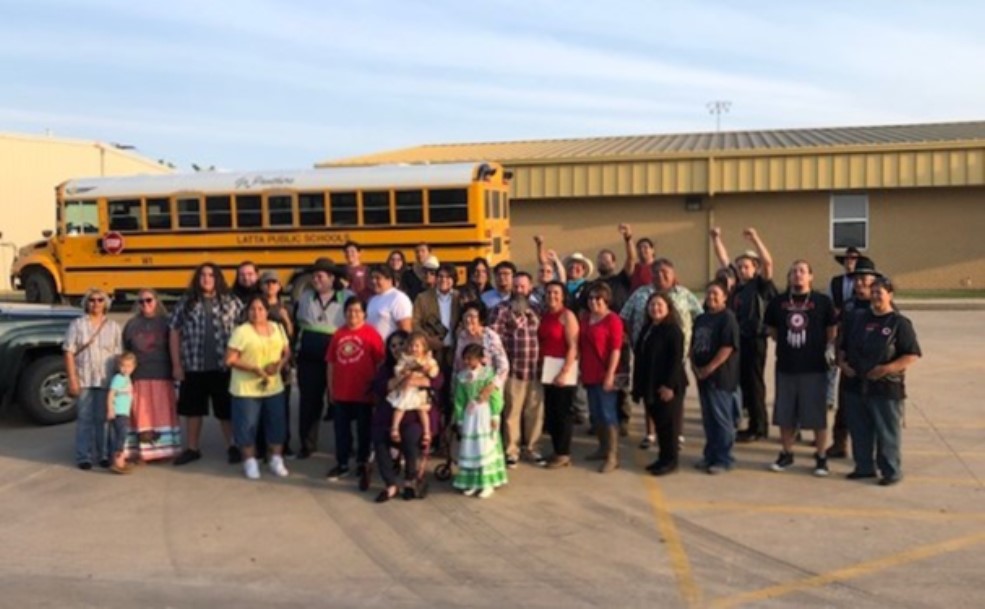Perspectives Joy in Latta after Oklahoma school board changes graduation policy
to accommodate Native Americans 
Above: Tvli Birdshead and his family and supporters celebrate the
decision of the Latta School District. It is graduation season, which means a time for diplomas, gowns and mortar boards. In
tribal communities, it can also mean a time for eagle feathers, which are commonly worn at graduation by indigenous students for religious and spiritual reasons. Some school districts, however, have policies that prohibit students from wearing anything on their graduation caps. The question of whether the uniform policies infringe upon the religious rights of Native American students creates a controversy around this time each year.
For the Class of 2019, the controversy arose in Latta School District in Ada, Oklahoma, when Tvli Birdshead, a member of the Chickasaw Nation, wanted to wear an eagle feather during his high school graduation ceremony. Despite 48% of the students in Latta School District being Native American, the school graduation policy did not permit students to wear
anything other than school-issued attire, which does not include eagle feathers. Tvli and his family decided to fight to have the school’s graduation policy changed.
For many tribal members in the United States, eagle feathers are a sacred object that symbolizes a spiritual connection to the creator that are prevalently used in religious and cultural traditions. Eagle feathers are also given to others to signify honor and accomplishment. Receiving an eagle feather from a tribal elder is among the highest honors bestowed upon a tribal member. With the graduation rate for American Indians being among the lowest of any racial or ethnic group, it has become commonplace for a tribal elder to honor a student with the gift of an eagle feather to wear during their graduation ceremony.
This gift is a recognition of a significant educational achievement and the student’s transition to becoming an adult. When the student wears the eagle feather at graduation, it is a sign of honor to that student, to the student’s family and to God. If a school prohibits that student from wearing an eagle feather at graduation, it deprives the student of that honor and blessing, thereby curtailing the student’s free exercise of religion. Oklahoma Attorney General Mike Hunter has directly addressed the question of whether a school board policy prohibiting a student from wearing an eagle feather at a graduation ceremony would be a violation of the student’s religious rights. In a May 8,
2019, letter to Oklahoma’s Secretary of Education and Oklahoma Superintendent of Public Instruction, Joy Hofmeister, Attorney General Hunter stated that prohibiting students from wearing ceremonial eagle feathers on their graduation caps “would substantially burden their free exercise of religion.” He stated that the restraint on this free exercise cannot be justified by a school’s desire to promote uniformity or avoid “slippery slope” outcomes, which are not compelling state interests. Even if the school did have a compelling interest, a policy prohibiting ceremonial eagle feathers at graduation might not be the least restrictive means for advancing such interest. Many schools have enacted policies with religious exemptions for adorning graduation caps which have not
compromised the order, seriousness, and celebration of a graduation ceremony. Accordingly, Attorney General Mike Hunter opined in his letter that a school policy prohibiting a Native American student from wearing a ceremonial eagle feather at graduation would likely be a violation of law. When the importance of eagle feathers to Native American tribes and the legal rights of Native American graduates were brought to the attention of the Latta Public Schools by the Birdshead family and their supporters, the school board reconsidered its position and unanimously voted to amend its policy to allow Indian students to wear eagle feathers and other objects of religious significance during
commencement ceremonies. When a school board recognizes the cultural and religious diversity of its student body and voluntarily changes its policy, the outcome is favorable for everyone. As Attorney General Mike Hunter noted, an eagle feather hasn’t ruined a graduation yet. In the case of the Latta School District, the school board members expressed joy after the meeting about adopting a new policy to accommodate its Native American students, calling it long overdue. Hopefully the countless school boards that are still unaware of the potential problems with a graduation policy that requires uniformity will follow suit.
—R. Daniel Carter R. Daniel Carter, dcarter@cwlaw.com, assisted Tvli Birdshead in advocating for a change in school policy, along with the Native American Rights Fund, Oklahoma Indian Legal Services and American Civil Liberties Union.
Mr. Carter and Mr. Gomez, dgomez@cwlaw.com, have represented multiple American Indian students asserting the religious right to wear eagle feathers during their graduation commencement.
|


